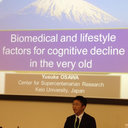Tobacco alkaloid derivatives as inhibitors of breast cancer aromatase.
Sleutelwoorden
Abstract
The inhibition of estrogen biosynthesis by the use of aromatase inhibitors is emerging as a valuable approach to breast cancer therapy. Because smoking has a profound effect on estrogen-related processes we examined the ability of tobacco constituents to suppress estrogen production by breast cancer aromatase. N-n-octanoylnornicotine and N-(4-hydroxyundecanoyl) anabasine suppressed aromatase activity in culture of two human breast cancer cell lines, MDA-MB-231 (IC50 of 310 and 20 microM, respectively) and SK-BR-3 (IC50 of 450 and approximately 2 microM, respectively). MDA-MB-231 cells induced by 250 nM dexamethasone or 1 mM (Bt)2cAMP were slightly more sensitive to both inhibitors. Kinetic analyses showed that inhibition by N-(4-hydroxyundecanoyl)anabasine is competitive with respect to androstenedione as substrate, with apparent Ki values of 0.2 microM against microsomal aromatase activity derived from both (Bt)2cAMP-induced MDA-MB-231 cells and human breast tumor tissue. The corresponding apparent Ki against human placental microsomal aromatase activity was 0.4 microM. These results indicate that acyl derivatives of nornicotine and anabasine block estrogen formation in breast tumor cells and tissue and could contribute to the decreased intra-tissue estrogen levels in women who smoke.


